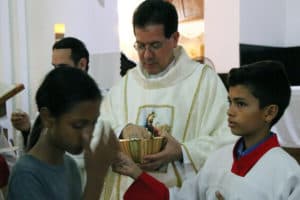Bishop: ‘the plagues of Egypt are nothing compared to what Venezuela is going through’
IT IS ESTIMATED that 65 percent of Venezuelan households live in poverty. The situation is worsened by the COVID-19 crisis. According to official sources, there are 10,428 positive cases and 100 deaths. But the impact on the country’s miserable economy is brutal: 70 percent of households cited the rise in food prices as their biggest problem. Bishop Polito Rodríguez Méndez of San Carlos in the State of Cojedes, in the Central Plains of Venezuela, describes the country’s current situation in an interview with Aid to the Church in Need (ACN):
The bishop said: “Venezuela has entered a time of famine. Every day things get worse. The economy is paralyzed, there is no industry nor work in agriculture. The Gross Domestic Product is below zero. The most affected are the poorest who have nothing to eat and no chance to lead a decent life. We need help from abroad to give them something to eat at least once a week.

“Everything is dollarized; a family earns about three or four dollars a month. An egg carton costs two dollars and a kilo of cheese three dollars. Before, the people were poor, now they just can’t make it. The State of Cojedes is known for its mangoes, and so many people have mangoes for breakfast, lunch and dinner. Otherwise, I don’t know what they can do. We have been under quarantine for more than two months and everything has become very expensive. We can’t go on like this.”
According to the bishop, the coronavirus pandemic is just beginning to take its toll on the country; “Last week a priest died in Maracaibo. As there are no signs [of why], we do not know [from what], but the symptoms are those of COVID-19. Churches have been closed for four months, and priests have nothing to eat. The bishop is working miracles.”
Another serious problem is that many people managed thanks to remittances from the approximately five million Venezuelans who work outside the country. Due to the pandemic, many of them have lost their jobs and remittances have dropped by 25 percent. It is feared that thousands of Venezuelan migrants who lost their jobs in Colombia, Peru, Chile and Argentina might try to come home, and they could include people with COVID-19.
“The other day, I met a seminarian who was crying. His parents had been laid off. They have nothing to live on and they can’t send their son anything. We are living on God’s providence,” said Bishop Rodriguez.
In recent weeks, large parts of the States of Cojedes, Portuguesa and Barinas, among others, have experienced an infestation of worms that wiped out banana trees and pastures for livestock. “The plagues of Egypt are nothing compared to what we are suffering here, nothing,” the bishop said. This whole situation is very depressing; the number of suicides is up. We have to overcome the difficulties in order to provide spiritual assistance; this is fundamental. Our station broadcasts Mass on Sundays, and we continue our pastoral work on social media. We cannot lose heart.”
Admitting that when he prays, he “argues with God,” he added: “Above all, I ask him for mercy, as alone we cannot do it. Our strength comes from him. God loves his people, he is not going to leave us alone, and the Church, too, is not going to leave the people on their own. And I am not only referring to humanitarian aid, but also to what we can do to fully empower people and fight corruption, apathy, the lack of a sense of responsibility. All this also impoverishes the population.
“We have to seek international support; alone we cannot do it. There are no supplies, no motivated staff, no food. The country is falling apart. We must ask the international community for humanitarian and medical aid, because if we do not, either COVID-19 or hunger will kill us.”
—Maria Lozano

